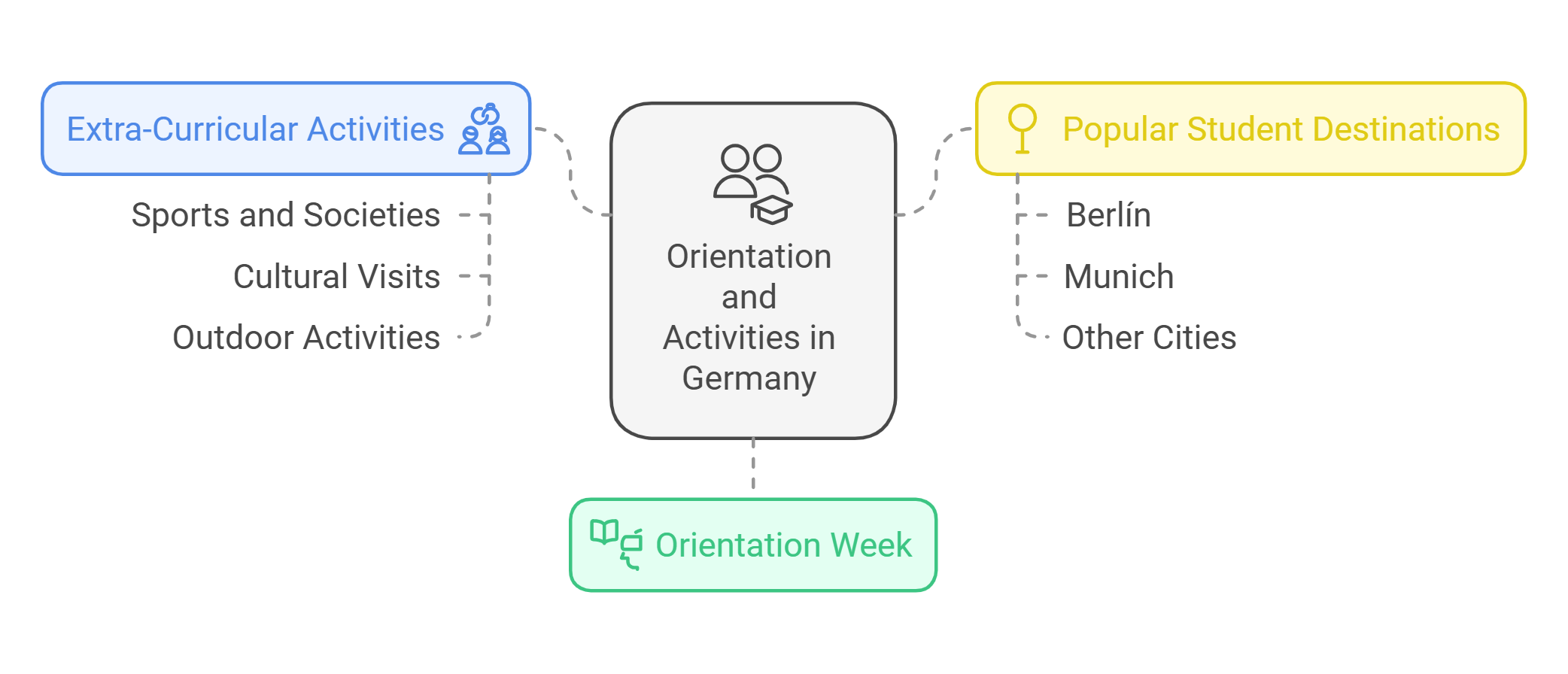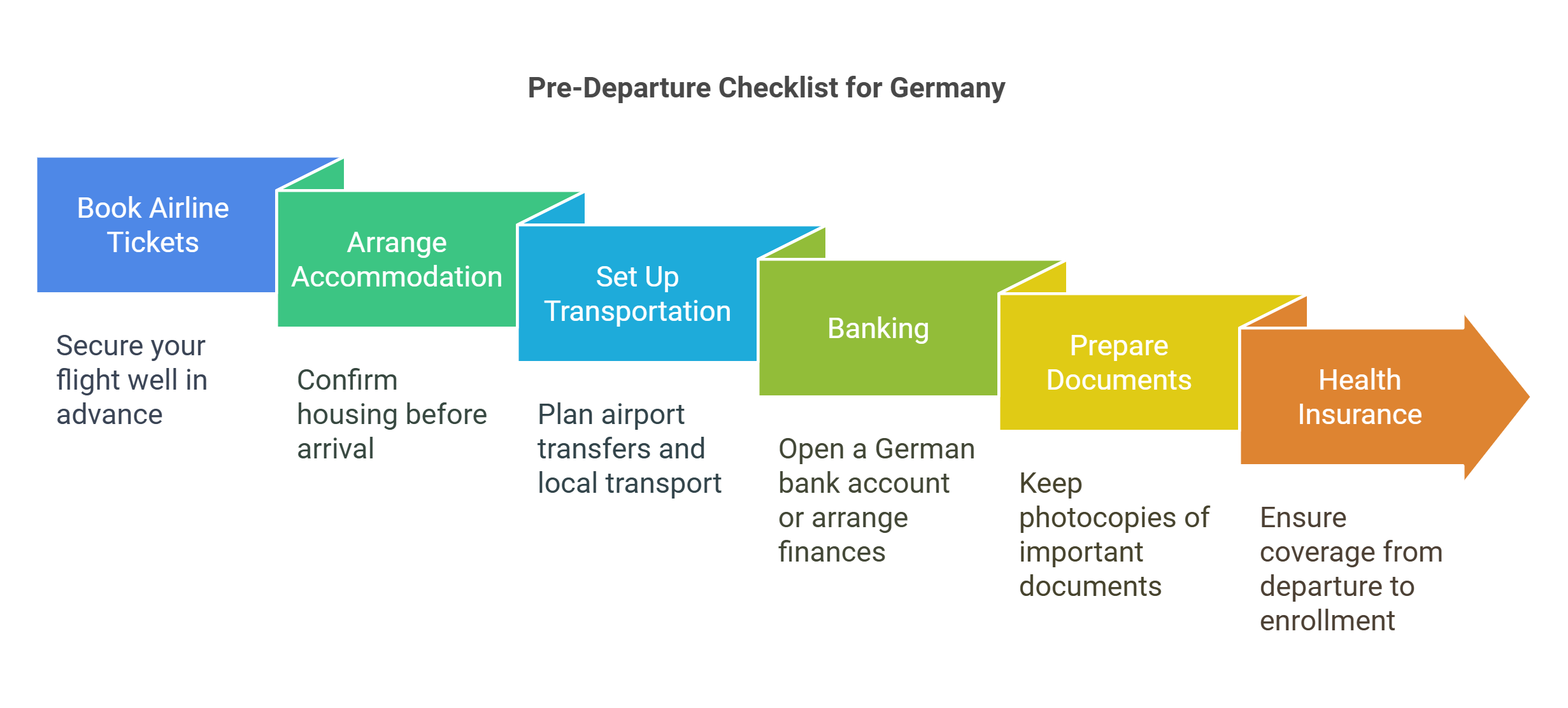.png?h=35&w=35&mode=stretch)
Yatin Kumar Study Abroad Content Specialist
Study Abroad Content Specialist
Highlights
- High-Ranking Universities: Universities in Germany ranking among the top 100 include the Technical University Munich, Ludwig Maximilian University of Munich, and Heidelberg University.
- Admission Requirements: A minimum academic percentage of 65% is required for admission to top universities in Germany, but it is recommended to have an exceptional academic record due to high competition.
- Popular Courses: MS in Automotive Engineering, Data Analytics, Computer Engineering, MBA, B Ed Teaching, and Bachelor’s in Engineering Education are some of the most popular courses in Germany.
- Public and Private Universities Fees: Most of the public universities in Germany don’t charge a tuition fee, and charge a nominal semester contribution ranging from EUR 300 to EUR 6,000 instead. Private universities cost EUR 10,000 to EUR 40,000.
Germany is the most popular non-Anglophone study destination for Indian students, offering quality education, industry integration, and numerous opportunities for international exposure.
- Quality Education: Over 423 higher education institutions offering 2,200+ programs.
- Industry Integration: Strong collaboration between universities and industries, especially in engineering and finance.
- No Tuition Fees: Most public universities in Germany are state-funded with no tuition fees.
- English-Taught Courses: Available primarily at the master’s level, facilitating easier language transition.
- Top-Ranked Universities: Includes Technical University of Munich, Ludwig Maximilian University of Munich, University of Heidelberg, Free University of Berlin.
Also Check: Best M.S Universities/Colleges in Germany
Education System in Germany
The German education system emphasizes theoretical knowledge, practical projects, and independent learning, catering to diverse educational needs.
- Types of Institutions:
- Public Universities: Free or nominal tuition fees, funded by the government.
- Private Universities: Funded through tuition fees, generally more expensive.
- Vocational Schools: Often funded by employers, focusing on practical skills.
- Teaching Approach:
- More theoretical with extensive lectures.
- Emphasis on independent learning, assignments, and practical projects.
- Mandatory internships in certain fields.
Top Universities and Programs in Germany
Germany boasts several top-ranked universities offering a wide range of programs across undergraduate, master’s, and PhD levels.
Bachelor’s Programs (Taught in German)
| University | QS Ranking 2025 | Popular Programs |
|---|---|---|
| Technical University Munich | #28 | B.Ed Teaching |
| Ludwig Maximilian University Munich | #59 | B.S Business Education |
| Heidelberg University | #84 | B.A Education Studies |
| RWTH Aachen University | #99 | B.S Structural Engineering-Vocational |
| Free University of Berlin | #97 | B.A Educational Science |
| University of Freiburg | #212 | B.A Educational Science and Education |
| University of Hamburg | #191 | B.A/B.S Teacher in Grammar School |
| Karlsruhe Institute of Technology | #102 | B.S Engineering Education |
Master’s Programs (English and German)
| University | QS Ranking 2025 | Top MS Programs |
|---|---|---|
| Technical University of Munich | #28 | Civil Engineering, Automotive Engineering, Computational Science and Engineering |
| Ludwig-Maximilians-Universität München | #59 | Data Science, Software Engineering, Physics |
| Free University of Berlin | #97 | Bioinformatics, Biochemistry, Computer Science |
| Humboldt University of Berlin | #126 | Chemistry, Economics, Management & Information Systems |
| Karlsruhe Institute of Technology | #102 | Geophysics, Optics and Photonics, Water Science and Engineering |
| Technical University Berlin | #147 | Civil Engineering, Computer Science, Electrical Engineering |
| RWTH Aachen University | #99 | Data Analytics, Management & Engineering in Technology |
| University of Freiburg | #212 | Nursing Sciences, Biochemistry and Biophysics, Biology |
PhD Programs
| University | QS Ranking 2025 | Programs/Faculty |
|---|---|---|
| Technical University of Munich | #28 | Econometrics, Strategic Management, Innovative Technologies |
| Ludwig Maximilian University Munich | #59 | Humanities, Social Sciences, Natural Sciences |
| Humboldt University of Berlin | #126 | Individual Doctorate, Structured PhD Programs |
| University of Bonn | #227 | Microeconomic Theory, Financial Economics, Econometrics |
| Free University of Berlin | #97 | Humanities & Social Sciences, Computational Neuroscience |
| RWTH Aachen University | #99 | Mathematics, Computer Science, Medicine, Engineering |
| University of Goettingen | #252 | Neurosciences, Biophysics, Molecular Biosciences |
| University of Freiburg | #212 | Humanities, Natural Sciences, Engineering, Cooperative Doctoral Research Groups |
Admission Requirements in Germany
Understanding the admission requirements is crucial for a successful application to German universities.
Undergraduate
| Requirement | Details |
|---|---|
| Academic Score | 65% or above in 12th standard |
| Language Proficiency | B1 German (CEFR) |
| Additional Requirements | Studienkolleg (if needed), TestAS (for some universities) |
Master’s
| Requirement | Details |
|---|---|
| Academic Score | Bachelor’s degree with 75% GPA or equivalent |
| Language Proficiency | IELTS 6.5 (for English programs) or B1 German |
| Documents | Transcripts, passport, CV, motivation letter, recommendations |
Required Documents
| Document | Details |
|---|---|
| Completed application form | Filled and signed |
| Recognized school-leaving certificate | From previous education |
| Previous university transcripts | For postgraduate applications |
| Language proficiency proof | IELTS/B1 German |
| Passport copy and photo | Valid passport and recent photo |
| Motivation letter & recommendations | If applicable |
| Curriculum Vitae (CV) | Updated CV |
| Standardized test scores | TestAS, GMAT/GRE if required |
| APS Certificate | Required for certain programs |
Also Check: Documents Required for Student Visa Germany
Visa Requirements in Germany
Obtaining a student visa is essential for studying in Germany. Ensure you have all necessary documents and understand the application process.
| Requirement | Details |
|---|---|
| Visa Fee | EUR 75 (~INR 6,815) |
| Documents Needed | - Filled visa application form- Valid passport- Birth certificate- Health insurance (covering until enrollment)- University admission letter- Cover letter (study plans)- Proof of university payment- Proof of financial resources |
Residence Permit
- Duration: Valid for up to two years; extendable if the course duration exceeds two years.
- Cost: Approximately €100
- Processing Time: 8-12 weeks
- Documents Required:
- Confirmation of registration from Resident Registration Office
- Proof of health insurance
- Student ID and enrollment certificate
- Proof of financial resources
- Valid passport and visa
- Rental contract
- Passport-sized photos
Cost of Studying in Germany
Understanding the financial aspects is crucial for planning your studies in Germany.
Tuition Fees
| University | Annual Tuition Fees | INR Equivalent |
|---|---|---|
| Technical University Munich | €6,000 | ₹5.45 lakh |
| Ludwig Maximilian University Munich | €287 | ₹26.1K |
| Heidelberg University | €3,000 | ₹2.72 lakh |
| RWTH Aachen University | €520 | ₹47.2K |
| Free University of Berlin | €8,200 | ₹7.45 lakh |
| University of Freiburg | €3,000 | ₹2.72 lakh |
| University of Hamburg | €680 | ₹61.7K |
| Karlsruhe Institute of Technology | €1,500 | ₹1.36 lakh |
- Public Universities: Typically free or minimal fees.
- Private Universities: Fees can range up to €20,000 (~₹5.29 lakh) annually.
Living Expenses
| Expense | Monthly Cost (EUR) | Monthly Cost (INR) |
|---|---|---|
| Rent (including utilities) | €410 | ₹37,340 |
| Food | €198 | ₹18,000 |
| Health insurance | €100 | ₹9,100 |
| Transportation | €89 | ₹8,100 |
| Tuition fees | €76 | ₹6,900 |
| Recreation, culture, sports | €65 | ₹5,900 |
| Clothing | €46 | ₹4,200 |
| Semester contribution | €36 | ₹3,300 |
| Working materials (books, etc.) | €31 | ₹2,800 |
| Communication (Phone/Internet) | €32 | ₹2,900 |
| Other expenses | €144 | ₹13,100 |
| Total | ~€992 | ~₹91,040 |
Everyday Items Cost
| Item | Cost (EUR) |
|---|---|
| 1 loaf of bread (500g) | €2 |
| 1 kg potatoes | €0.99 |
| 1 litre of milk | €0.90 |
| 1 bottle of mineral water (0.75L) | €0.80 |
| 1 cup of coffee (café) | €2.50 |
| 1 glass of beer (pub) | €3 |
| 1 pizza (restaurant) | €7 |
| 1 lunch (cafeteria) | €2.50 |
| 1 T-shirt | €10-€50 |
| 1 pair of trousers | €30-€100 |
| 1 cinema ticket (student discount) | €6 |
| 1 theatre ticket (student discount) | €6-€30 |
| 1 museum ticket (student discount) | €2-€8 |
Accommodation in Germany
Choosing the right accommodation is vital for a comfortable stay in Germany. Explore your options and plan accordingly.
| Accommodation Type | Details |
|---|---|
| University-Managed | Options include catered and self-catered housing |
| Private Rental | Through landlords or private listings; requires signing a tenancy agreement |
| Cost Considerations | Varies by city and type; average rent ~€410/month |
| Tips | Start early, understand your lease, consider location and amenities |

Finding suitable accommodation is crucial for a comfortable and successful study experience in Germany. The following table provides a detailed overview of accommodation options, average rents, and tips for some of the most popular German cities for international students:
| City | Average Rent (Shared Room - WG) |
Average Rent (Single Apartment) |
|---|---|---|
| Berlin | €300 - €500 | €600 - €900 |
| Munich | €400 - €600 | €800 - €1,200 |
| Heidelberg | €350 - €550 | €600 - €900 |
| Frankfurt | €350 - €550 | €700 - €1,000 |
| Cologne | €300 - €500 | €600 - €900 |
| Hamburg | €350 - €550 | €700 - €1,000 |
| Stuttgart | €350 - €550 | €700 - €1,000 |
| Dresden | €300 - €500 | €600 - €900 |
Tips for finding accmmodation in Germany:
- Start Early: Housing markets in popular cities are competitive. Begin your search several months in advance.
- Use Reliable Platforms: Websites like WG-Gesucht, ImmobilienScout24, and Studenten-WG.de are popular for finding shared and private accommodations.
- Prepare Documents: Have all necessary documents ready, including proof of enrollment, SCHUFA (if available), passport copies, and references.
- Visit if Possible: If feasible, visit potential accommodations to inspect the condition and meet potential roommates.
- Beware of Scams: Never send money without verifying the legitimacy of the listing and the landlord.
- Consider Location: Proximity to your university, public transportation, and essential amenities can significantly impact your daily life.
- Budget Accordingly: Factor in additional costs like utilities, internet, and transportation when planning your budget.
Germany offers a wide range of accommodation options tailored to different preferences and budgets. By understanding the specific housing landscape of your chosen city and starting your search early, you can secure a comfortable and affordable place to live during your studies.
Placements and Work Permits
Understanding the job market and work permit regulations is essential for post-graduation success in Germany.
Placements
- Career Services: Universities have Career Services cells to assist with job placements and interview preparation.
- Job Search: Primarily self-driven; networking and proactive search are essential.
Work Permit
| Feature | Details |
|---|---|
| Duration | 18 months post-graduation |
| Average Salary | INR 35-45 lakh per year |
| Top Employers | Siemens, Bosch, BMW, Volkswagen, Daimler, Continental, Carl Zeiss AG |
| Popular Job Roles | Engineers, Analysts, Consultants |
Conditions:
- Students can work up to 180 days part-time or 90 days full-time per year.
- Post-study work permit allows graduates to stay for 18 months to find relevant employment.
Scholarships in Germany
Germany offers various scholarships to support international students financially. These are primarily merit-based, rewarding academic excellence and extracurricular achievements.
| University | Scholarship | Eligibility | Amount (Euro) |
|---|---|---|---|
| Free University of Berlin | DAAD | Top 30% graduates or 85% aggregate | €861/month |
| University of Kaiserslautern | Merit Scholarships | Academic excellence | Tuition Fee Waiver |
| University of Mainz | Santander Postgraduate Internationalisation Scholarship | Excellent academic achievements | €6,030 |
| Ulm University | Stibet Scholarship | Academic achievement | €750/month for 3-4 months |
| EBS Business School | International Scholarship | Merit basis | €300/month |
| University of Kiel | Erasmus | Academic excellence | €33,600 (€1,400/month x 24 months) |
| ESCP Business School | Academic excellence | Merit basis | €15,000 |
Also Check: Scholarships in Germany
Additional Scholarships:
- Many universities offer merit-based and need-based scholarships.
- Ensure all required documents are submitted by deadlines.
- Presentation and application quality are crucial for eligibility.
Education Loans to Study in Germany
Financing your education through loans is a viable option. Understand the eligibility criteria, loan details, and required documentation.
Eligibility Criteria
| Criteria | Details |
|---|---|
| Nationality | Must be an Indian national |
| Academic Record | Strong academic performance |
| Course Type | Professional, technical, or job-oriented courses |
| Age | Must be above 18 years (or parents can apply) |
| Admission | Secured admission to a recognized foreign university |
Loan Details
| Feature | Details |
|---|---|
| Loan Amount | Up to ₹20 lakh for studies abroad |
| Margin Amount | Typically 20% of total fees required from the student |
| Processing Fee | Varies by bank; may be fixed or a percentage |
| Repayment | Starts after course completion or within one year of employment |
| Repayment Period | Generally 5-7 years, extendable up to 10 years |
Required Documentation
- Acceptance letter from the university
- Fee schedule
- Mark sheets of previous examinations
- Letters of recommendation (academic or professional)
- Statement of Purpose (SOP)
- Proof of funds and financial stability
Lifestyle and Safety in Germany
Living in Germany is safe and offers a high quality of life. Understanding the lifestyle and safety measures can enhance your experience.
Safety
- General Safety: Germany is considered a safe country with low crime rates.
- Public Security: Increased use of security cameras in public areas and transportation.
- Terrorism: Rare violent crimes related to terrorism; most residents feel safe.
Weather
| Season | Temperature Range | Characteristics |
|---|---|---|
| Winter | -10°C to 3°C | Cold and snowy |
| Summer | 22°C to 35°C | Hot with unpredictable rains |
| Overall | Varies by region | Diverse landscapes across 16 states |
Lifestyle Tips
- Language: Learning basic German enhances daily life and job prospects.
- Socializing: Germans enjoy socializing and participating in festivals.
- Food: Enjoy traditional German cuisine and explore diverse international options.
- Transportation: Reliable public transport; consider a private car for flexibility.
- Cultural Integration: Participate in local activities to overcome homesickness and integrate smoothly.

Accommodation in Germany
Finding suitable accommodation is crucial for a comfortable stay. Explore your options and plan accordingly.
| Accommodation Type | Details |
|---|---|
| University-Managed | Options include catered and self-catered housing |
| Private Rental | Through landlords or private listings; requires signing a tenancy agreement |
| Cost Considerations | Varies by city and type; average rent ~€410/month |
| Tips | Start early, understand your lease, consider location and amenities |
Also Check: Student Accommodation in Germany
Germany offers a robust education system with affordable tuition and numerous opportunities for Indian students. From top-ranked universities and diverse programs to supportive scholarship options and post-graduation work permits, Germany stands out as an excellent choice for higher education. By understanding the admission process, visa requirements, and living arrangements, you can make the most of your study experience in Germany and achieve a high return on investment.
FAQs
Ques. Do I need IELTS to study in Germany?
Ans. Yes, for English-taught master’s programs, an IELTS score of at least 6.5 is required. For German-taught courses, B1 German proficiency is needed. IELTS is not required for undergraduate studies as courses are taught in German.
Ques. Can I study in Germany if I don’t know any German?
Ans. Yes, especially for master’s programs with English instruction. However, learning German is recommended for better job opportunities.
Ques. Is studying in Germany actually free?
Ans. Public universities do not charge tuition fees, making education affordable. However, living costs still apply.
Ques. What types of jobs can I get after graduation?
Ans. Roles such as Automotive Engineer, Project Manager, Structural Engineer, Financial Analyst, Bioinformatics Engineer, and Business Consultant are common.
Ques. How long can I stay after graduation?
Ans. Graduates can obtain an 18-month work permit to seek employment.





1720688571.png?tr=w-305,h-145,c-force?h=40&w=40&mode=stretch)










Comments